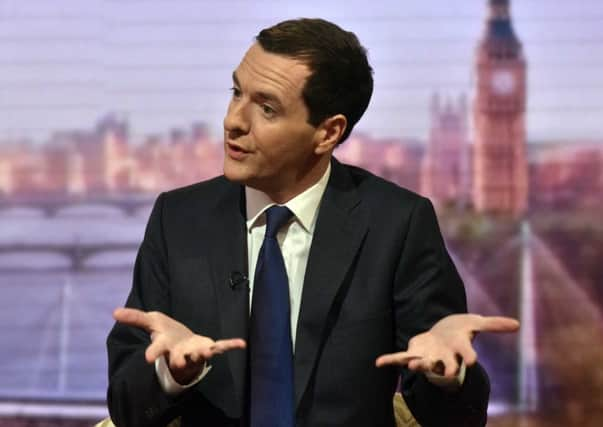Women ‘worst hit’ by Budget cuts to welfare


Chancellor George Osborne confirmed that he intends to push ahead with a further £12 billion of cuts to the welfare bill, including a benefits cap of less than £23,000 for those outside London. He will set out his plans in Wednesday’s Budget.
But a report published today by Holyrood’s welfare reform committee says there has been a “devastating” impact on women as a result of the cuts in the last Parliament as multiple benefits were reduced.
Advertisement
Hide AdAdvertisement
Hide AdIt finds that “existing inequality” for women has been aggravated by the recent social security cuts, covering issues around childcare, the gender pay gap and women’s role as primary carers.
And changes to the benefits system – including the introduction of Universal Credit – could put women off a return to work.
Committee convener Michael McMahon said: “The evidence we have set out confirms the devastating impact on women of the UK government’s reforms to the social security system.
“Of particular concern is the cumulative impact on women hit by multiple benefits cuts, from child support to carer’s allowance.
“The UK government urgently needs to look at how women are being affected by these changes, and we are also calling on the Scottish Government to look at the gender impact of their own policy decisions.”
The impact of the cuts cover a range of groups including disabled women, lone parents, carers, and those experiencing domestic abuse, the report says.
Women’s incomes are twice as reliant on the benefits and tax credit system as men, meaning they are at an increased risk of “sustained poverty”, the report says. It means that spending on children also falls.
“The risks between women’s and children’s poverty are widely recognised,” the report states.
Advertisement
Hide AdAdvertisement
Hide AdThe impact of the reductions are “creeping up” on women who may not notice the impact immediately, but gradually find they are unable to pay for basics like replacing school clothes, MSPs heard in evidence to a recent inquiry.
This includes a 1 per cent cap on maternity pay increases, which is leaving mothers about £330 a year worse off.
Rising costs for energy and transport have also not been met by rises in wages.
Changes in the system of tax credits have had a major impact on many women. Some of the most substantial changes it cited have included removal of the baby element from child tax credit, which was worth £545 in the first year.
The working tax credit for most couples with children who are working at least 16 hours a week has also gone. Instead, couples are now required to work at least 24 hours a week between them. This results in a loss of up to £3,870 a year. Childcare costs covered by working tax credit have been cut from 80 per cent to 70 per cent, causing working parents to lose up to £1,560 a year.
And the way Universal Credit calculates entitlement by including the “second” earner’s income – usually women – will put many off returning to work.
The Scottish Government’s welfare minister, Margaret Burgess, said: “It is alarming to see that women have been disproportionately affected by the UK government’s benefits cuts and are twice as dependent on social security than men. I am deeply concerned that the UK government’s £12bn cuts will only widen this gap.
“With our new powers we will create a fairer and simpler social security system that aims to tackle gender and other inequalities. However, we need to know how the UK government’s cost-cutting will affect benefits that are to be devolved.”
Advertisement
Hide AdAdvertisement
Hide AdChancellor George Osborne revealed yesterday that he would be looking to reform the welfare system to ensure it is fair to working people.
He said: “It is not fair that people out of work can earn more than people in work so we are going to cut the benefit cap, as we said in our manifesto, to £23,000 in London – it will be lower in the rest of the country.
“We have got to have a welfare system that is fair to those who need it but also fair to those who pay for it.”
He indicated tax credits paid to people on low incomes is an area in which he would be looking to make savings.
“It has become a very, very expensive system. When it was introduced, we were told by Gordon Brown it was going to cost a couple of billion pounds,” he said.
“It now costs £30bn. That is a huge sum of money.
“That’s three times the Home Office budget, so we have to make savings.”
But Labour shadow chancellor Chris Leslie warned against the prospect of further cuts to the system which allows families to meet basic living costs.
He said: “Don’t underestimate how important some of these tax credits have been, not just helping people be able to afford to be able to go to work – all those travel costs, childcare costs and so forth – but also there’s an important principle about helping the very most vulnerable society.”
Advertisement
Hide AdAdvertisement
Hide AdThe Chancellor said he would also be cutting “taxpayer-funded subsidies” for higher earners living in social housing.
From 2017-18, he said local authority and housing association tenants on incomes of £40,000 or more in London and £30,000 in the rest of England will have to pay a market, or near-market, level of rent.
Mr Osborne indicated he is not planning to cut the top 45p rate of tax, saying his priority is reducing taxes for lower and middle income earners.